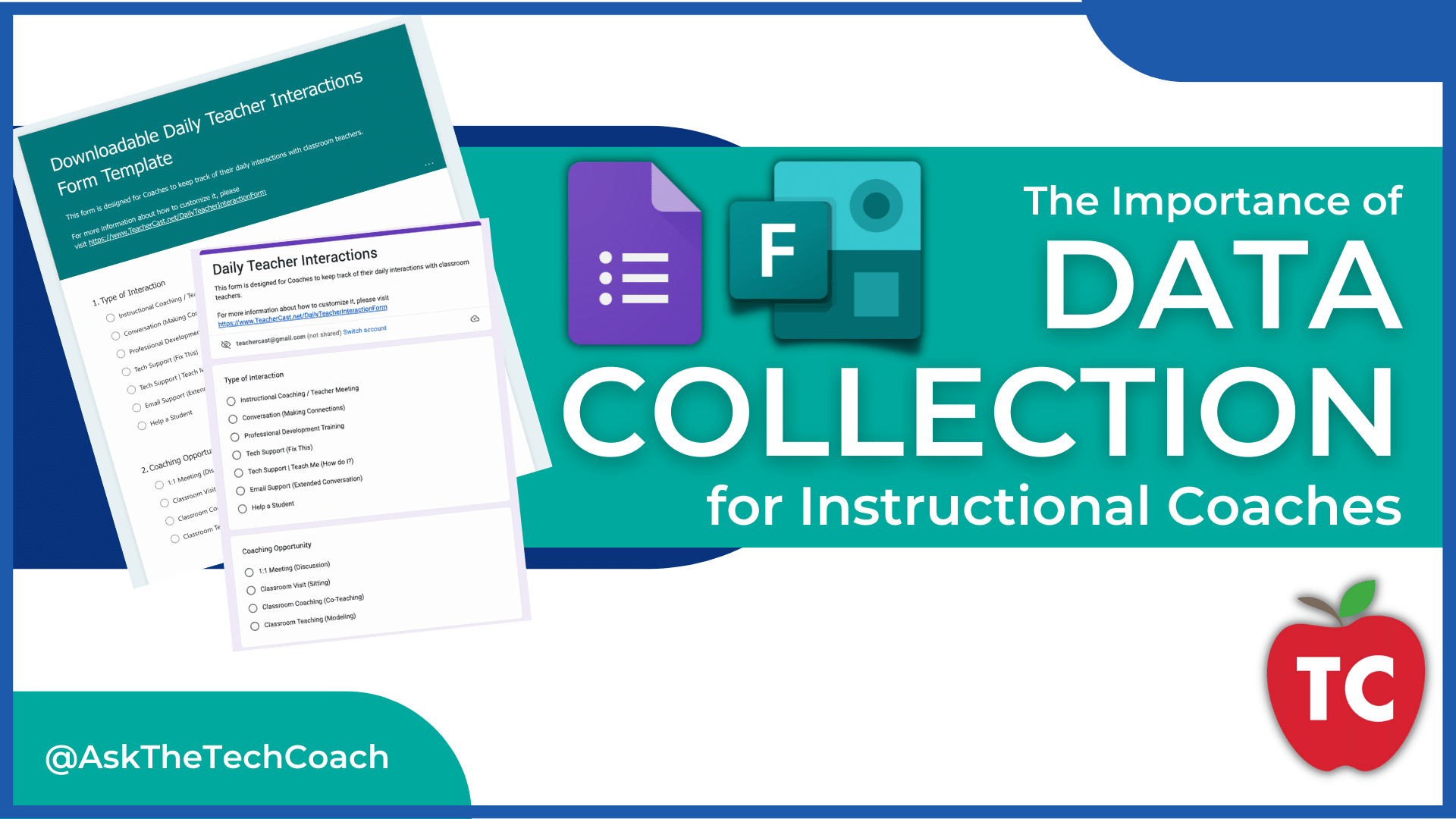Instructional Coaches Daily Teacher Interaction Tracker
Every day, Instructional Coaches enter their schools bright-eyed and ready to go. They spend the early part of their day interacting with teachers in their buildings to make sure they are caught up on what is happening in classrooms while at the same time trying to schedule visits and coaching conversations to support the curricular needs of both teachers and students. They may also spend time in the main office mingling with the office staff hoping to get a green light to visit their principals to discuss the latest building initiatives.
At some point in the school year, the coach might sit down with their administrator or supervisor to discuss the progress they have been making in the classrooms.
What happens next is usually one of two things.
- The coach says “let me show you my calendar … it”s full of events, meetings, and other interesting things … and look … It’s colorful!
- The coach opens up their coaching data dashboard and presents a series of charts, graphs, and meaningful information about what they have done during the school year complete with links to artifacts to projects they have worked on with both teachers and students.
The question today is … “Are you currently Coach #1, or Coach #2?”

Why is Data Collection Important?
In order to answer the question about the importance of having a solid data collection system, it is important to ask two very important questions first.
What is the role of the Instructional Coach in your district and/or school building?
As we learned about in our Instructional Coaching Newsletter blog post series, the Instructional Coaching position is an extension of the school district’s Strategic Plan.
Nothing more … Nothing Less
At some point, the district leadership team and the Board of Education came together and approved a series of Strategic Goals that would set the stage for all activities that will be happening in the school district for one, two, or even up to five years. The members of the district’s senior leadership team are then tasked with meeting those goals and improving the school district.
Let’s say that one of your district’s goals is to improve scores in both Mathematics and English, it might be logical that the district then provides support for teachers so that they have the ability to raise those test scores. One of the support systems put in place might be the Math or ELA Instructional Coach.
Additionally, many school districts have digital learning goals to improve the Future Readiness of their students. To support both teachers in learning how to implement these skills and to support technology-based goals, the district might create a Digital Learning department and support teachers through the use of “Tech Coaches.”
In this example, the “role of the Instructional Coach” is to serve the strategic goals of the district. You as a coach, are “the answer” to the question “how do we raise test scores and support our teachers in the classroom.”
How does an Instructional Coach support their role in the district?
If the role of the Instructional Coach and its main function in the district is to be the vehicle from which the strategic plan is carried out and its goals achieved, then the coach must find a way to do this. In meeting the requirements of this role, the coach then goes into classrooms and meets with teachers, sets up coaching cycles, and provides professional development sessions to support their goals of (for example) raising test scores.
Does this make sense?
How can Data be Collected by Instructional Coaches?
Over the last few years, I have seen a variety of methods for keeping track of teacher and staff interactions, and where they are all good, each of them seems to have its good and bad points.
So, what do you do?
A few years ago, I created a simple Daily Teacher Interaction Tracker using Google Forms, and believe me … it saved me a ton of time each day AND it provided me, my digital learning team, and my principal with the data that we needed to support our teachers and students.
What is a Daily Teacher Interaction Tracking System?
A Daily Teacher Interaction Tracking System is a tool that coaches use every day … in fact, several times a day to account not just for the work that they do with teachers, but what type of work they do.
Sample questions include:
- Type of Coaching
- Time Spent with Teacher
- Topics Covered
- Follow Up Topics
By having and using a tool such as a Daily Teacher Interaction Tracking System, you can quickly analyze the data and know which staff members need additional information, or what topics you might want to build Professional Development around.
How Do You Create a Daily Teacher Interaction Tracking System?
Luckily for you, we have two ways that you can create a Daily Teacher Interaction Tracking System for yourself or for your school district. Each has its own merits and they are each designed to help you save time and have the right tools, (free tools) to give you the information you need in your classrooms.
Method 1: Create Your Own Daily Teacher Interaction Tracking System
To help get you started, I have created a short video as part of our Tech Coach Weekly Video series to help you learn more about how to use Google Forms to keep track of teacher interactions.
- 00:00 – Start
- 00:34 – Building Your Tracker Form
- 01:13 – Type of Interaction
- 02:00 – Type of Coaching Opportunity
- 02:26 – What Building Are You In?
- 02:54 – Time Working With Staff Members
- 03:36 – Reason For Staff Interaction
- 04:19 – How to … vs … What is?
- 05:01 – Type of Coaching Support Given
- 05:40 – Do You Need To Follow Up?
- 06:04 – Final Thoughts
Method 2: Download our FREE TEMPLATE TODAY!
If you are looking to save a bit of time, we would also encourage you (after watching the video above) to download our FREE Google Forms Template.
By doing so, you will be automatically enrolled in our TeacherCast Instructional Coaching Network and will also begin to receive our exclusive tips, tricks, and tutorials that we provide at no charge to our Professional Coaching Communitities.
What Happens to the Data Collected?
Once your data is collected, it’s time to make some type of sense of it so you can present it to your building and district leaders. This is where your Instructional Coaches Data Dashboard comes handy. In this video, we walk you through the process of creating a simple data dashboard using Google Sheets, Google Forms, and Google Sites.
Learn How to Create Dynamic Charts and Graphs using Google Sheets
Video Time Stamps
- 00:00 – Start
- 00:48 – How to Look at Google Forms Results Data
- 01:37 – Export Data into Google Sheets
- 02:11 – How to Create a NEW Google Sheet for your Data
- 02:56 – How to resize multiple Columns in Google Sheets
- 03:31 – How to Format Column Headers in Google Sheets
- 03:47 – How to add a Boarder in Google Sheets
- 04:21 – How to Create a Chart in Google Sheets
- 04:46 – How to Create a 3D Chart in Google Sheets
- 05:29 – How to Create a Bar Chart in Google Sheets
- 07:01 – Final Wrap-up and Review
Don’t forget to Subscribe to our YouTube Channel for more information!
Why are Instructional Coaching Data Tracking Systems Important?
You might be reading through this post, watched through the videos ,and asked “What’s the point?”
The point is this …
As an Instructional Coach, our primary function is to help our administration meet their goals. We do this by interacting with teachers and supporting them in the classroom. If we aren’t doing everything we can to support our administrators, we might wake up one day without administrators to support.
By creating a data dashboard, we can not only have data-based conversations with our district administrators, but we can also give THEM data to then show to their supervisors to justify the need for an Instructional Coaching position in the district.
Get The Support You Need For Your Instructional Coaching Program Today!
Are you searching for the best ways to support and grow your Instructional Coaching program this year? The best way to do that is by joining the TeacherCast Instructional Coaches Network.
By joining the TeacherCast Instructional Coaches Network, you will have access to:
- 3 Distinct Professional Learning Networks designed to help you grow for network other Coaches and Digital Learning Leaders
- Free Downloadable Templates and Coaching Resources that can be used in your district … tomorrow!
- Direct access to Jeff Bradbury and all off his “offline” content that he creates during the school year.
- Exclusive TeacherCast and “Ask the Tech Coach” podcast episodes directly relating to the questions that YOU ASK in our PLN groups.
- Weekly email check-ins to stay connected and discuss your Instructional Coaching program!
- Monthly invitations to TeacherCast Instructional Coaching Meetings and Webinars
- … and more!
Join The TeacherCast Instructional Coaches Network Today!







